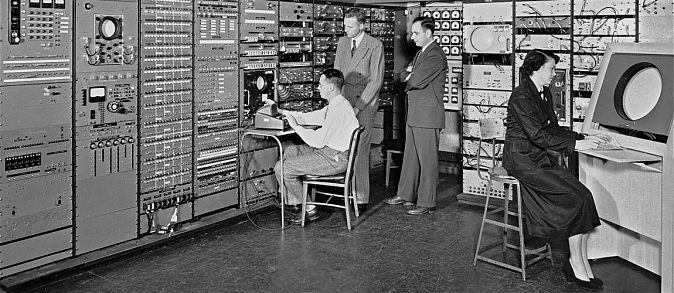|
March 01, 2015 CC BY 4.0 |
print comment |
Keywords: big data | biopower | digital media | surveillance

Source: http://www.mitre.org/about/our-history
Until March 19, 2015, when our conference "Historicizing Foucault" begins in Zurich, we will consecutively publish the abstracts of the accepted presentations. Colin Koopman, Associate Professor of Philosophy at the University of Oregon, will talk about "Historicizing the Critique of Power: From Biopower to Infopower" in the panel Critique of Power on March 20, 2015.
Foucault's work provides us with philosophical capabilities that remain robust and fresh even despite the distance of his context from our historical present today. Where Foucault's milieu was defined by the politics of the prison, the politicization of sexuality, and growing suspicion of the psy-sciences, our contemporary politics today is a different assemblage defined by the complicated financial products of investment capital, enhanced security state apparatuses targeting suspected terrorists, and the strange swirl of informatics that spans from social media to big data analytics to surveillance databasing. There is no doubt that Foucault remains relevant to the politics of these and other aspects of the bewildering now. But just as surely, there can be no doubt that Foucault's ongoing relevance requires great care on our part to disinter his concepts and methods from the scene of their original formulation in order to mobilize them midst our new panoramas.
This paper accordingly offers a two-fold intervention. First, in the context of Foucault scholarship, I expand on an argument developed in previous work in which I distinguish between Foucault's methodological tools (e.g., genealogy, archaeology) and the concepts he created through the deployment of those tools (e.g., biopower, discipline). This distinction helps us affirm the need for genealogies of our present untied from Foucault's own conceptualizations of his present. As we gain distance from core practices of biopower (as witnessed by all the recent 'beyond biopower' literature), we need to leverage our available methodological tools so as to critique new modalities of power that arise in the midst of Foucault.
My second intervention is the beginnings of a genealogy of one contemporary modality of power operative across some of the contexts named at the outset: finance capital, the security state, but most especially the new informatics at work in social media and big data. To move beyond the familiar summative clichés for this latter constellation of practices ('the information age' or 'the internet society') we need to follow Foucauldian genealogy in order to interrogate a political shift in the very nature of power itself. We find ourselves midst a new form of power that originally emerged within the context of biopower but has recently assumed a gravity all its own: infopower.
To interrogate the workings of this modality of power I draw on Foucault-inspired geographers (Louise Amoore), anthropologists (Stephen Collier, Paul Rabinow) and new media theorists (Wendy Chun, Tiziana Terranova). In conversation with this emerging body of scholarship, my argument is that the concern of infopower is less that of regulating, surveilling, and normalizing populations and more that of the programming, grasping, and fastening (in the double sense of both tying down and quickening up) of data subjects (what I call 'informational persons') that can be later leveraged for biopolitical, disciplinary, and sovereign uses. It is imperative that we begin to understand how this emergent power works, and how we work (or fail to) within it.


